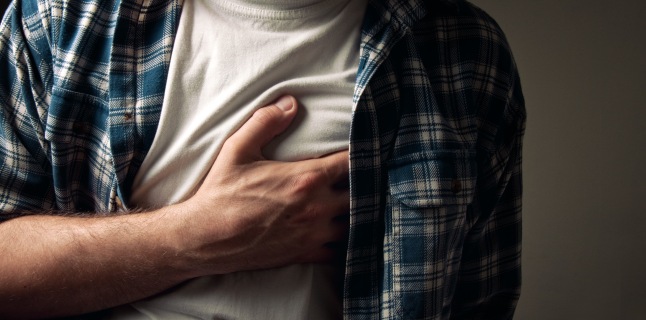Palpitations - when they become a concern?

Most of the time, stress or anxiety is one of the main factors in the occurrence of palpitations. They can also occur because of excessive consumption of caffeine, alcohol,. Sometimes, however, they also occur on the background of heart disease - in such situations, palpitations can be the cause of serious or even serious rhythm disorders. It is therefore extremely important for patients experiencing palpitations to go to the doctor for investigations, especially if palpitations are followed by dizziness or chest pain. • Strong emotions such as fear, stress • Caffeine, nicotine, alcohol • Intense physical activity • Anemia, fever • Hypoglycemia • Pregnancy. When palpitations occur in the context of heart disease, they are most often the expression of a heart rhythm disorder.
Only in rare cases are palpitations a sign of disease - either hyperthyroidism or osteoarthritis. Arrhythmia can mean too fast beating, that is, tachycardia, too rare beating, or irregular beats, that is, atrial fibrillation. The most important investigation that patients with palpitations have to carry out is the (electrocardiogram) that will first determine the cause of the disease. At the same time, the ECG will determine the type of heart rhythm disorder. There are also situations when, in order to determine the cause of the palpitations, the patient will perform other investigations such as blood count, thyroid activity or radiological examinations.
The treatment of palpitations will be recommended depending on the substrate, but also the disease that has produced them. Adopting a balanced lifestyle, avoiding alcohol consumption and administering sedative and anxiolytic drugs are needed in case of palpitations without a pathologic cardiac substrate. Treatment of patients with palpitations due to cardiovascular disease will be determined depending on the condition and the type of rhythm disturbance that has produced them. The treatment may be a pharmacological one consisting of antiarrhythmic administration, but sometimes it may be indicated to implant some or certain percutaneous or surgical myocardial revascularization. .
Source : sfatulmedicului.ro
Views : 2901
Popular Article
- (photo) Nude becomes art.
Posted: 2018-03-17, 9642 views.
- The harmful effects of air conditioning on the skin
Posted: 2017-06-08, 8332 views.
- 3 causes of dyed hair discoloration
Posted: 2017-06-15, 8199 views.
- Why early puberty occurs in girls: symptoms, favors, diagnosis and treatment
Posted: 2017-10-24, 8053 views.
- Good or bad skin treatments in the hot season
Posted: 2017-06-07, 7784 views.
Recommendations
- (photo) Nude becomes art.
Posted: 2018-03-17, 9642 views.
- The harmful effects of air conditioning on the skin
Posted: 2017-06-08, 8332 views.
- 3 causes of dyed hair discoloration
Posted: 2017-06-15, 8199 views.
- Good or bad skin treatments in the hot season
Posted: 2017-06-07, 7784 views.
- Risks of practicing sports on hot days
Posted: 2017-06-12, 7388 views.
 4 effective ingredients in the fight against acne.
4 effective ingredients in the fight against acne. How to get rid of hiccups fast
How to get rid of hiccups fast The wheat bran diet: the secret of lost pounds as if by magic
The wheat bran diet: the secret of lost pounds as if by magic The recipe that will sweeten your soul this weekend!
The recipe that will sweeten your soul this weekend!  Is it dangerous or not to refreeze meat after thawing it?
Is it dangerous or not to refreeze meat after thawing it?  The unusual sign of diabetes indicated by saliva.
The unusual sign of diabetes indicated by saliva. What to drink to boost your immune system.
What to drink to boost your immune system. 10 foods that help you never age.
10 foods that help you never age. What actually happens in your body if you drink a cup of coffee for breakfast
What actually happens in your body if you drink a cup of coffee for breakfast 5 surprising benefits of chia seeds
5 surprising benefits of chia seeds